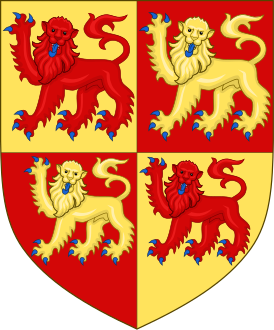
The Legislatures of the United Kingdom are derived from a number of different sources. The Parliament of the United Kingdom is the supreme legislative body for the United Kingdom and the British overseas territories with Scotland, Wales and Northern Ireland each having their own devolved legislatures. Each of the three major jurisdictions of the United Kingdom has its own laws and legal system.

Royal assent is the method by which a monarch formally approves an act of the legislature. In some jurisdictions, royal assent is equivalent to promulgation, while in others that is a separate step. Under a modern constitutional monarchy royal assent is considered to be little more than a formality; even in those nations which still, in theory, permit the Monarch to withhold assent to laws, the Monarch almost never does so, except in a dire political emergency or upon the advice of their government. While the power to veto a law by withholding royal assent was once exercised often by European monarchs, such an occurrence has been very rare since the eighteenth century.
An Order in Council is a type of legislation in many countries, especially the Commonwealth realms. In the United Kingdom this legislation is formally made in the name of the monarch by and with the advice and consent of the Privy Council (Queen-in-Council), but in other countries the terminology may vary. The term should not be confused with Order of Council, which is made in the name of the Council without royal assent.

A statutory instrument (SI) is the principal form in which delegated legislation is made in Great Britain.

Senedd Cymru, or the Welsh Parliament in English, is the democratically elected, devolved, unicameral legislature of Wales. It represents the interests of the people of Wales, makes laws for Wales, agrees certain taxes and holds the Welsh Government to account. As a bilingual institution, both Welsh and English are the official languages of its business. From its creation in 1999 until May 2020, the Senedd was known as the National Assembly for Wales.

The Welsh Government is the devolved executive of Wales. The government consists of ministers, who attend cabinet meetings, and deputy ministers who do not, and also of a counsel general. It is led by the First Minister, usually the leader of the largest party in the Senedd, who selects ministers and deputy ministers with the approval of the Senedd. The government is responsible for tabling policy in devolved areas for consideration by the Senedd and implementing policy that has been approved by it.

Politics of England forms the major part of the wider politics of the United Kingdom, with England being more populous than all the other countries of the United Kingdom put together. As England is also by far the largest in terms of area and GDP, its relationship to the UK is somewhat different from that of Scotland, Wales or Northern Ireland. The English capital London is also the capital of the UK, and English is the dominant language of the UK. Dicey and Morris (p26) list the separate states in the British Islands. "England, Scotland, Northern Ireland, the Isle of Man, Jersey, Guernsey, Alderney, and Sark.... is a separate country in the sense of the conflict of laws, though not one of them is a State known to public international law." But this may be varied by statute.

Margaret Ann Jones MS is a Welsh Labour Co-operative politician. Born in Rhyl, Denbighshire, Jones has been the Member of the Senedd for Vale of Clwyd since 1999. Since 11 May 2016, she has been the Deputy Presiding Officer of the Senedd Cymru.
Politics in Wales forms a distinctive polity in the wider politics of the United Kingdom, with Wales as one of the four constituent countries of the United Kingdom (UK).

The Government of Wales Act 2006 is an Act of the Parliament of the United Kingdom that reformed the then-National Assembly for Wales and allows further powers to be granted to it more easily. The Act creates a system of government with a separate executive drawn from and accountable to the legislature.
This article explains the citation of United Kingdom legislation, including the systems used for legislation passed by devolved parliaments and assemblies, for secondary legislation, and for prerogative instruments. This subject is relatively complex both due to the different sources of legislation in the United Kingdom, and because of the different histories of the constituent countries of the United Kingdom.

Heraldry in Wales has a tradition distinct from that of English and Scottish heraldry. There is evidence that heraldry was already being used in Wales by the middle of the thirteenth century; for instance, in Gwynedd, two sons of Llywelyn the Great are recorded as having borne coats of arms in this period. Following the integration of Wales into England in the fourteenth and fifteenth centuries, the Welsh heraldic tradition became merged into that of England.

Welsh law is the primary and secondary legislation generated by the Senedd, using devolved authority granted in the Government of Wales Act 2006 and in effect since May 2007. Each piece of Welsh legislation is known as an Act of the Senedd. The first Welsh legislation to be proposed was the NHS Redress (Wales) Measure 2008. This was the first time in almost 500 years that Wales has had its own laws, since Cyfraith Hywel, a version of Celtic law, was abolished and replaced by English law through the Laws in Wales Acts, enacted between 1535 and 1542 during the reign of King Henry VIII.

A Measure of the National Assembly for Wales is primary legislation in Wales that is a category lower than an Act of Parliament. In the case of contemporary Welsh law, the difference with Acts is that the competence to pass Measures is subject to 'LCOs' or Legislative Competence Order, which transfers powers to the Assembly by amending Schedule 5 of the Government of Wales Act 2006.
In Wales, a Legislative Competence Order was a piece of constitutional legislation in the form of an Order in Council. It transferred legislative authority from the Parliament of the United Kingdom to the National Assembly for Wales. The LCO had to be approved by the Assembly, the Secretary of State for Wales, both Houses of Parliament, and then the Queen in Council.

In Wales, an Act of Senedd Cymru is primary legislation that can be made by Senedd Cymru under part 4 of the Government of Wales Act 2006. Prior to 6 May 2020 any legislation was formally known as Act of the National Assembly for Wales or informally, an Act of the Assembly).

In the United Kingdom, devolution is the Parliament of the United Kingdom statutory granting of a greater level of self-government to the Scottish Parliament, the Welsh Parliament, the Northern Ireland Assembly and the London Assembly and to their associated executive bodies the Scottish Government, the Welsh Government, the Northern Ireland Executive and in England, the Greater London Authority and combined authorities.

The National Assembly for Wales Act 2012 was an Act of the National Assembly for Wales that was given royal assent on 12 November 2012. It is significant in that it is the first Act passed in Wales to become law in over 600 years.

The Human Transplantation (Wales) Act 2013 is an act of the National Assembly for Wales, passed in July 2013. It permits an opt-out system of organ donation, known as presumed consent, or deemed concent. The act allows hospitals to presume that people aged 18 or over, who have been resident in Wales for over 12 months, want to donate their organs at their death, unless they have objected specifically. The act varies the Law of England and Wales in Wales, which relied on an opt-in system; whereby only those who have signed the NHS organ donation register, or whose families agreed, were considered to have consented to be organ donors.









